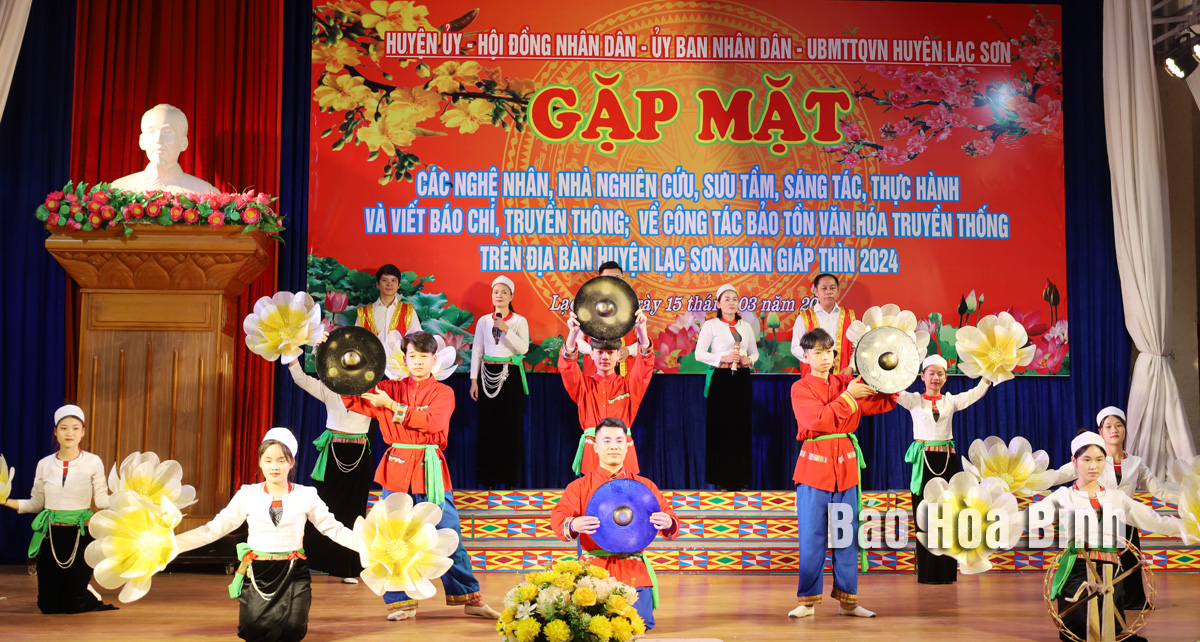
Through ups and downs, many unique cultural features of the Muong ethnic minority group are facing risks of falling into oblivion. However, with a strong determination, Lac Son district of Hoa Binh province has deployed synchronous solutions to preserve and promote the locality's cultural heritage values.
An art programme to honour and spread the Muong ethnic minority group’s cultural values
Recently, the district has issued nine resolutions, including Resolution No. 08-NQ/HU dated December 20, 2021 on preserving and promoting the Muong ethnic minority group's cultural identity.
Currently, the district has 196 relic sites, including three national and 13 provincial-level sites. The relic sites have been restored to meet the spiritual and cultural demands of people, contributing to the locality’s socio-economic development.
In 2023, the district submitted a dossier to the provincial People's Committee and the Ministry of Culture, Sports and Tourism for recognition of Trai cave in Tan Lap commune and stone roof of Vanh village in Yen Phu commune as special national relic sites.
The mobilisation of resources for the protection and promotion of relic values from the state budget, revenues from relics' activities and social sources have been stepped up. The activities of collecting, inventorying, preserving and displaying artifacts have made positive changes.
Bui Van Duong, Vice Chairman of the Lac Son district People's Committee, said that currently, there are nine traditional folk festivals in the area that have been restored and maintained to attract tourists. Since 2020, the district has proposed all levels submit 15 applications to the State Council. The State President conferred titles on eight artisans, including seven meritorious artisans and one people's artisan.
In the period of 2019 - 2023, the district People's committee directed relevant agencies to open more than 10 cultural heritage teaching classes on Muong gong, mo Muong, and brocade weaving, helping to preserve and promote cultural heritage values of the local Muong ethnic people in the locality.
The People’s Committee of Lac Son district held a ceremony on April 28 to receive the provincial relic certificate for the ancient rock carving site at Suoi Co stream, located in My Thanh commune.
A special music show titled "The country is in the fullness of joy” has been held at Hoa Binh Square in Hoa Binh city in celebration of the 50th anniversary of the liberation of the South and national reunification (April 30, 1975–2025).
The People's Committee of Lo Son commune, Tan Lac district, has organised the local annual traditional stream fishing festival on April 19 - 20.
As a land deeply intertwined with human history and Vietnam’s millennia-long journey of nation-building and defence, Hoa Binh is often revered for its epic tales and legends.
Residents of Hoa Binh boast a rich cultural identity, reflected in their unique language, traditional attire, customs, and folk melodies – described as "sweet as honey, clear as a mountain stream.”
Lac Son district’s Vu ban town held the 2025 Truong Kha temple festival on April 12–13 (the 15th–16th days of the third lunar month). Since its revival in 2019, the festival has been organised every three years, preserving valuable intangible heritage while meeting the community’s cultural and spiritual needs.



